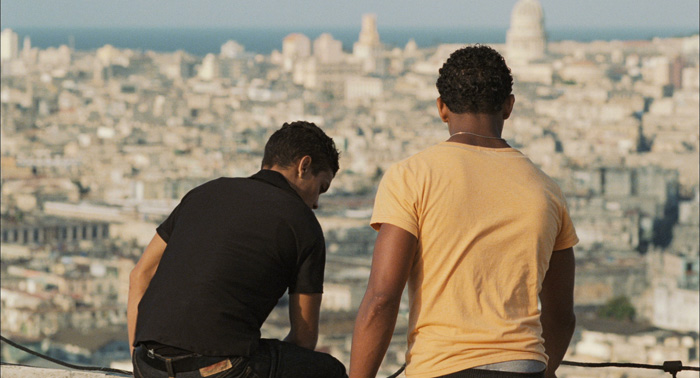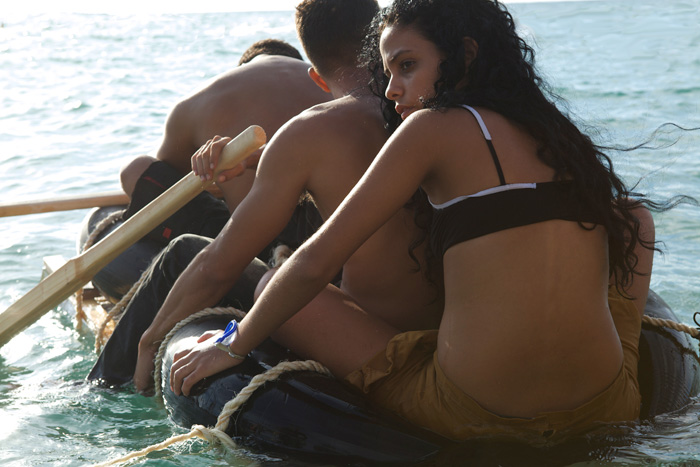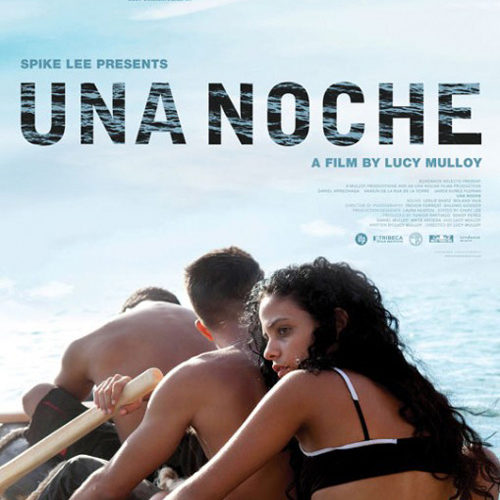If people didn’t know about the 90-mile expanse of Caribbean waters between Havana, Cuba and Key West, Florida before Elián González in 1999, they certainly did afterwards. Citizens residing in dictatorships have always used America’s “home of the free” slogan as a calling card to immigrate, defect, claim asylum, or simply live illegally—my hometown Buffalo Sabres even assisted in NHLer Alexander Mogilny’s 1989 defection from the Soviet Union. The mixture of civil rights restrictions and poverty can cause anyone to salivate at the prospect of freedom so it’s no surprise incidents still occur today. Proving not all do so via makeshift rafts through shark-infested waters, however, Una noche lead actors Javier Núñez Florián and Anailín de la Rúa de la Torre used an international trip in support of the film’s Tribeca premiere as their escape.

It’s a fascinating life imitating art imitating life affair as Lucy Mulloy’s harrowing Spanish-language drama about three youths leaving Cuba for Miami was inspired by true accounts before its stars used the press run to follow suit. The real life couple plays twins in the film that must reconcile familial love and heritage with the prospect of a better life off the island. Una noche begins with Elio (Florián) and his friend Raul (Dariel Arrechaga) preparing before transforming into a politically charged look at a populace trying to survive amidst a totalitarian government, sweatshop caliber employment, prostitution, and an ambivalent tourist elite. With sexual undertones, rampant homophobia, and vicious cattiness also, every adolescent hardship Americans face is amplified to the nth-degree as scuffles and misunderstandings result in a guilty until proven guilty standard of justice.
But these kids don’t really have a choice once actions to ready themselves place them in precarious legal situations that can only end with jail if their plan fails. This is their last opportunity for freedom, but while Raul is leaving behind a dying mother, Elio has his parents and sister Lila’s (de la Torre) wellbeing to tug at his heart. Caught between his duty to family and his unrequited love for Raul, Elio can’t help holding onto the sliver of optimism that says he’ll survive the sea, win his love’s heart, and find a way to share his salvation with those stuck back home. In order to even have a chance at such success, however, he will have to steal wood, trade his bike for supplies, and bribe hospital workers for medication.

Mulloy takes us through Havana to peer into windows and around corners at people doing whatever is necessary to survive. As Raul says at one point in frustration, Cuba is only good for sweating and sex—the heat from the former constantly causing everyone to be on edge and the latter a substitute for money. We witness how everything truly is available as long as you know whom to inquire about it. We bask in the cultural vibrancy of Spanish song. And we quickly understand the type of police state in practice—where only the assumption of your bothering a foreign visitor results in an alleyway beating. This is a raw, unfiltered account of abuse, poverty, and the slimmest glimmer of hope shot on location with amateurs who call(ed) the city their home.
De la Torre’s Lila serves as our narrator, showing us her bond with Elio from the start so we may empathize with her plight after realizing he’s about to leave without so much as a goodbye. But that sort of action is par for the course in a country looking out for itself—whether a black market medication purveyor or an apartment flea market barterer offering “deals” or a restaurant chef more prone to embarrassing his employees in front of the whole staff for their insolence rather than firing them. Watching the struggles of this one-day shows us enough to acknowledge that while rolling the dice for Florida may be a death sentence, it’s also the only chance at a life worth living most can ever hope to achieve.

Not to be outdone by this authentic depiction on land, however, Mulloy goes even further into the psyches of her characters by piling the tragic events of fate higher in a climactic finale steeped in uncontrollably horrifying events explaining the utter futility of their situation. Emotionally complex right until the finish, her ultimately heart-breaking resolution becomes rendered bittersweet once overall failures are outshined by a level of human compassion we could all do well to strive towards. With all the selfishness on display of people using one another, Elio glows as a beacon of faith. His generous spirit continuously flows via sacrifices for friend and family alike and his willingness to never surrender or let harm come to those he loves. His is a true example of selflessness that can never be repaid.
And this trio of actors—probably not too far removed from the plight of their characters—renders each and every second with the utmost credibility. Arrechaga exudes the charismatic machismo that appeals to his “girlfriends.” Elio, and to a lesser extent Lila as well as the vulnerability of a troubled soul yearning to find a father he’s never known. De la Torre provides a ray of sunlight, full of youth and spunk with a fearlessness transcending her age. And Florián is the rock they both look to for answers, shelter, and understanding. He knows the risks, weighs heart and mind before agreeing to go, and never asks for anything. They’re children with dreams stretching beyond their borders and a cautionary tale proving that happy endings sometimes do only happen in fairy tales.
Una Noche opens in limited release on Friday, August 23rd.

